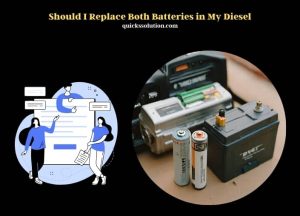Published on: July 8, 2023
Written by Amlan Roy / Fact-checked by Hashim Manna
When a car battery encounters water, it doesn’t create an immediate hazardous situation. The risk arises from the potential for corrosion and short-circuits, which can impair battery performance.
Consider a scenario where a car battery is sitting in water. The exterior casing is designed to resist moisture, thus, in the short term, the battery’s functionality may not be compromised. But prolonged exposure to water, especially if it’s salty or polluted, can lead to corrosion on the battery casing and terminals.

What happens if a car battery gets wet? Simply put, it can continue to function. But wetness can accelerate the corrosion process, potentially causing the battery to fail sooner than it would have under dry conditions. In extreme cases, if a car battery got wet and won’t start, the culprit could be water-induced corrosion that has disrupted the electrical connection.
Water on car battery terminals can lead to similar issues. It can encourage rusting and reduce the efficiency of the electrical connection between the battery and the car’s systems. The same is true for a car battery left out in rain. Despite their robust construction, batteries aren’t completely immune to the impacts of the elements.
Lastly, if you wonder whether it’s safe to pour water on a car battery, the answer is: it depends. Pouring distilled water onto the battery’s terminals can aid in cleaning and reducing built-up corrosion. Conversely, tap water can cause more harm due to its mineral content, potentially leading to further corrosion.
In essence, while car batteries are made to withstand various conditions, prolonged or repeated exposure to water can hasten wear and tear. Thus, they should be kept dry and clean to ensure their longevity and optimum performance.
Potential Damages to Car Battery in Water
Detriment to Battery Structure
Immersing a car battery in water, particularly if it’s not sealed properly, could lead to considerable damage. Key elements like electrodes and wires are prone to rapid degradation when soaked. Corrosion can set in quickly, rendering the battery unfit for use.
Dilution of Battery Acid
Inside the car battery, a strong acid is responsible for producing the electrical current that powers the vehicle. In the event that water infiltrates the battery, it can dilute this acid. The diluted acid will decrease the battery’s capacity to generate electricity, leading to reduced performance or outright failure.
The Risk of Explosion
Generation of Hazardous Gases
Water entering a car battery can instigate chemical reactions leading to the production of hydrogen gas. If the gas cannot escape, pressure can build up within the battery. In the presence of a spark or flame, this could lead to an explosion. Hence, the fear of a car battery exploding isn’t entirely unfounded if it is submerged in water.
Environmental Implications
Adverse Effects on Ecosystems
Disposing of car batteries in bodies of water like lakes or oceans is not just damaging to the battery, but also tremendously harmful to the environment. The chemicals within the battery, if leaked, can severely pollute water sources, destroy aquatic ecosystems, and pose risks to human health. Consequently, such practices are illegal in many jurisdictions, due to the serious and far-reaching environmental repercussions.
Proper Disposal of Car Batteries
Disposing of a car battery should be done responsibly. There are designated recycling facilities that accept old or damaged car batteries. By ensuring proper disposal, the potentially hazardous materials inside a car battery are safely handled and can often be recycled, leading to less environmental harm and a more sustainable use of resources.
FAQs
Can You Put Water in a Car Battery?
Yes, but only distilled water and only in certain circumstances. It’s often needed to replenish the electrolyte level in non-sealed lead-acid batteries. However, overfilling or using non-distilled water can cause damage.
What Happens If Your Car Battery Gets Wet?
Exposure to water can accelerate the corrosion process, particularly at the battery terminals. Over time, this can lead to reduced battery performance or outright failure.
Can the Same Protection Methods for Solar Panels in Water be Applied to a Car Battery?
When it comes to protecting solar panels from water damage, the methods used may not be suitable for a car battery. Solar panels are typically sealed with waterproof materials, while car batteries require ventilation. Different protection methods are needed to safeguard each from potential water damage.
What Occurs with a Car Battery Sitting in Water?
While car batteries are designed to resist moisture, prolonged exposure to water can cause corrosion of the casing and terminals, potentially leading to battery malfunction.
Does Rain Affect a Car Battery?
Rain itself is unlikely to harm a properly enclosed car battery. However, if water accumulates within the engine compartment or the battery is left exposed to rain, it could potentially lead to corrosion or damage.
Can Water Damage Car Battery?
Yes, it can. If water manages to penetrate the battery casing or cause corrosion on the battery terminals, it can impair the battery’s function or lead to premature failure.
Can Battery Terminals Get Wet?
They can, but it’s not ideal. Wet battery terminals can corrode over time, affecting the efficient flow of electricity from the battery to the car’s systems. If they get wet, they should be cleaned and dried promptly.
What Happens If a Car Battery Gets Wet?
Water itself doesn’t immediately harm a car battery. However, long-term exposure or getting water inside the battery can cause corrosion, damage, and a decline in performance. Also, it could potentially lead to an unsafe condition, such as a short circuit.
Conclusion
When a car battery goes in water, it can cause the battery to short circuit. This can lead to a fire or explosion. It is important to keep our car battery dry and away from water. Maintain the rules of what to do about wet or damaged battery and be safe from that situation.
Read more:




